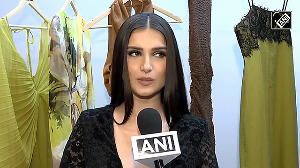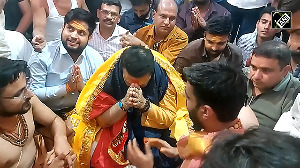The conviction of Indian-origin student Dharun Ravi in the webcam spying case has not only highlighted the homophobia that is prevalent within the South Asian community in United States but also the absence of meaningful dialogue in addressing stereotypes and cultural prejudices, says Harsha Mallajosyula, advocacy director of Trikone -- a non-profit organisation for lesbian, gay, bisexual, and transgender people of South Asian descent in San Francisco
Giving his reaction to the conviction of the 20-year-old on charges of hate crimes and bias intimidation, Mallajosyula told rediff.com, "The case brings to our attention the need for an on-going dialogue with in the South Asian community in the United States and also the sub continent."
On September 22, 2010, Tyler Clementi (Ravi's roommate) jumped off the George Washington Bridge days after learning that his same-sex encounter was captured and viewed by Ravi and his friends at Rutgers University. Ravi was not charged with causing Clementi's death.
Trikone, while strongly condemning Ravi's acts of invasion of privacy and bias intimidation, outlined the inherent cultural complexities at hand.
Mallajosyula said Ravi was just 18 years old at the time of the incident and it seemed that he had no cultural reference to homosexuality being normal.
"It shows his recklessness, and bullying is wrong. But it also strengthens some culture weakness that we have," he noted.
"I think intimidation and bullying is always wrong, but there is always a cultural context to it. It is not common to talk on such issues among South Asian families and stereotype stays in mind and you act like those stereotypes."
"We certainly need to talk about such things and have panel discussions. Gay people also work and interact with other South Asian families and are not weird. They are also engineers, lawyers, doctors. They (people) have misconception that gay people are not leaders and we should never encourage bullying," Mallajosyula said.
He said in the coming months, the NGO hoped to conduct workshops addressing homophobia, cultural stereotypes, mis-information around gender identity, sexual orientation and sexuality.











 © 2025
© 2025